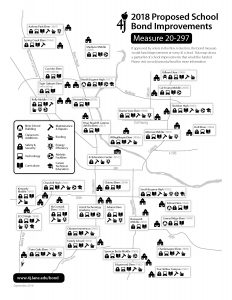Bond measure would fund improvements for every 4J school if approved Nov. 6
Measure 20–297, the school bond measure on the November 6 ballot, would fund improvements at every 4J school and for every student if it is approved by voters.
Every school would receive safety and security improvements, new curriculum materials and technology upgrades for a 21st century education.
 At every high school, the bond would enhance career technical education (vocational) opportunities and improve athletic facilities to be more equitable for girls and boys.
At every high school, the bond would enhance career technical education (vocational) opportunities and improve athletic facilities to be more equitable for girls and boys.
Many schools would have additional facility improvements, depending on the age and condition of the building.
In addition, the bond would pay to replace three aging school buildings with high-quality facilities built for school safety, modern seismic standards, sustainability, and 21st century education: Edison Elementary School, Camas Ridge Elementary School and North Eugene High School.
What would the bond measure provide at each school?
(click arrows to expand)
Churchill Region
Adams Elementary School (constructed in 1949)
Safety and security, technology, learning materials, roofing, building repairs, energy efficiency
Arts & Technology Academy (2017)
Safety and security, technology, learning materials, athletic facilities
Chávez Elementary School (2004)
Safety and security, technology, learning materials
Chinese Immersion School (1963)
Safety and security, technology, learning materials, roofing, building repairs
Churchill High School (1966)
Safety and security, technology, learning materials, roofing, building repairs, athletic facilities, career technical education
ECCO (Bailey Hill site, 1949)
Safety and security, technology, learning materials, roofing, building repairs, energy efficiency, career technical education
Family School (1963)
Safety and security, technology, learning materials, roofing, building repairs
Kennedy Middle School (1965)
Safety and security, technology, learning materials, roofing, building repairs
McCornack Elementary School (1968)
Safety and security, technology, learning materials, roofing, building repairs, energy efficiency
Twin Oaks Elementary School (1958)
Safety and security, technology, learning materials, roofing, building repairs, energy efficiency
Learn more: Churchill region info sheet
North Eugene Region
Awbrey Park Elementary School (1967)
Safety and security, technology, learning materials, roofing, building repairs, energy efficiency
Corridor Elementary School (relocating)
Safety and security, technology, learning materials
Howard Elementary School (2016)
Safety and security, technology, learning materials
Kelly Middle School (1945)
Safety and security, technology, learning materials, roofing, building repairs, energy efficiency, athletic facilities
Madison Middle School (2005)
Safety and security, technology, learning materials, athletic facilities
North Eugene High School (1957)
New building, safety and security, technology, learning materials, athletic facilities, career technical education
River Road/El Camino del Río Elementary School (2017)
Safety and security, technology, learning materials
Spring Creek Elementary School (1964)
Safety and security, technology, learning materials, building repairs
Yujin Gakuen Elementary School (relocating)
Safety and security, technology, learning materials
Learn more: North Eugene region info sheet
Sheldon Region
Buena Vista Elementary School (1960)
Safety and security, technology, learning materials, roofing, building repairs, energy efficiency
Cal Young Middle School (2006)
Safety and security, technology, learning materials, athletic facilities
Gilham Elementary School (1966)
Classroom additions, safety and security, technology, learning materials, roofing, building repairs
Holt Elementary School (2004)
Safety and security, technology, learning materials
Monroe Middle School (1965)
Safety and security, technology, learning materials, roofing, building repairs, energy efficiency
Sheldon High School (1963)
Safety and security, technology, learning materials, roofing, building repairs, athletic facilities, career technical education
Willagillespie Elementary School (1950s)
Safety and security, technology, learning materials, roofing, building repairs
Learn more: Sheldon region info sheet
South Eugene Region
Adams Elementary School
(see Churchill region)
Camas Ridge Elementary School (1949)
New building, safety and security, technology, learning materials
Charlemagne Elementary School (1959)
Safety and security, technology, learning materials, roofing, building repairs
Edgewood Elementary School (1962)
Safety and security, technology, learning materials, roofing, building repairs
Edison Elementary School (1925)
New building, safety and security, technology, learning materials
Fox Hollow Campus (1967)
Safety and security, technology, learning materials, roofing, building repairs
Roosevelt Middle School (2016)
Safety and security, technology, learning materials
South Eugene High School (1953)
Safety and security, technology, learning materials, roofing, building repairs, energy efficiency, athletic facilities, career technical education
Spencer Butte Middle School (1960)
Safety and security, technology, learning materials, roofing, building repairs, athletic facilities
Learn more: South Eugene region info sheet
How would these improvements be paid for?
If the bond measure is approved by voters, it would provide $319.3 million for school improvements, and the state of Oregon would provide $8 million in matching funds.
Property tax rates would increase by about $0.66 per $1,000 of assessed value, to a rate of $2.25 per $1,000 assessed value for Eugene School District bond debt. Property taxes would increase by about $11 a month or $135 a year for the median homeowner in the district, with an assessed property value of $204,000.
If the bond measure is not approved by voters, the district would not receive the proposed bond funds or the state matching funds to pay for school improvements. The property tax increase would not occur and the bond tax rate would decrease by about $0.20 to $1.39 per $1,000 assessed value next year.
Without bond funds, the district would not be able to replace and modernize school buildings, improve security at all schools, update learning materials, or complete other major capital improvements. Money for repairs and maintenance would come out of the budget for classroom education.
How to vote in the November 6 election?
All registered voters who live in Eugene School District 4J are eligible to vote on the bond measure.
• You must be registered to vote by October 16.
• Ballots will be mailed to voters beginning October 17.
• The bond measure is Measure 20-297. It will be at or near the end of the ballot, and may be on the back side.
• Completed ballots must be returned to a ballot drop box by 8 p.m. on Tuesday, November 6.
• To register to vote or find a ballot drop box, visit www.lanecounty.org/elections.
Learn more
This information, except for website links, was reviewed by the Oregon Secretary of State’s Office for compliance with ORS 260.432. (SH 18-126)
